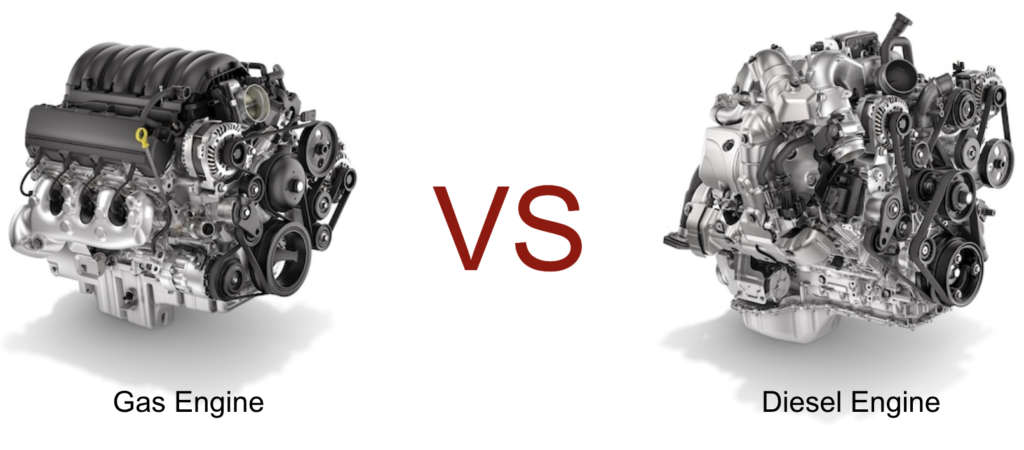Gasoline engines are a special kind of internal combustion engine. The initially compressed fuel-air mixture is ignited by an electric spark, which leads to its ignition and expansion. Let’s take a closer look at this type of engine.
The Principle of Gasoline Engine Operations
An engine system that consumes gasoline fuel consists of the following components:
- spark plugs;
- cylinders;
- valves;
- piston;
- connecting rod;
- crankshaft.
The main component of a gasoline engine is the cylinder block with pistons. The number of cylinders depends on the modification of the engine; there can be four, six, eight, or more. The piston in each cylinder is connected to the crankshaft via a connecting rod. From above, the cylinder block is closed by the cylinder head, in which there are intake and exhaust valves – a pair for each cylinder. Through these, the fuel-air mixture is fed, and the exhaust gases are exhausted.
A spark plug is responsible for igniting the combustion mixture. During combustion, the gases expand and cause the piston and connecting rod head to move up and down. The connecting rod head, which is attached to the crankshaft, rotates in a clockwise direction.
The crankshaft rotates through 360 degrees in two (up and down) moves of the piston in the cylinder. The flywheel is rigidly attached to the crankshaft, and the clutch basket is attached to it, through which the engine torque is transmitted to the transmission.
The power of the gasoline engine is controlled by a special throttle valve (throttle). The throttle regulates the air supply to the cylinders and the formation of the air-fuel mixture. From all of the above, it is clear that without fuel, in this case without gasoline, the car will not move. But situations are different, and it is not always possible to provide for all options. If you happen to run out of gas in Fort Lauderdale, simply contact MaxOil at https://maxoilinc.com/fuel-delivery-fort-lauderdale/ and your problem will be solved.
Features of Gasoline Engines
Cars equipped with gasoline power units have many advantages:
- excellent dynamic characteristics;
- resistance to low temperatures;
- low vibration and noise level;
- economical maintenance;
- the durability of motors.
With the same volume, the power of a gasoline engine will usually be higher than that of a diesel engine. Therefore, a gasoline-powered car will be an excellent choice for those who like to feel free on the freeway. By the way, not without reason, sports cars are equipped with gasoline motors in the overwhelming majority.
Power units that run on gasoline are less demanding to the quality of fuel than diesel. Certainly, dynamics will worsen because of low-quality fuel, but a car will go. In the worst case, you’ll have to clean the injectors after a while.
One more peculiarity of modern petrol engines is installing electric drives for power increase/decrease instead of classical cable on a pedal. This option is installed on almost all models with cruise control and allows you to distribute fuel optimally.
But the gasoline engine also has its disadvantages:
- higher fire and explosion hazards;
- more demanding on oil quality;
- worse traction at low engine speeds;
- higher fuel consumption with the load growth.
Modern Petrol Engines
In older cars, the choke is controlled by the gas pedal. On the contrary, modern petrol engines are hi-tech mechanisms, which are controlled by the electronic control unit. The throttle in these cars changes its position with the help of an electric motor controlled by the electronic unit. There is a potentiometer in the pedal unit, which changes the resistance force depending on the gas pedal pressure’s power and sends a corresponding signal to the engine control unit.
The new-generation gasoline engines range from the simplest to the most powerful. Gasoline-powered engines of different volumes and capacities can be found on the models. Each of them is based on the production of mechanical energy through the absorption of the fuel-air mixture.

How to Keep a Gasoline Engine Running?
The reliability and durability of a gasoline engine in almost all cases are determined by the technology used in production. However, not everything depends on the manufacturer.
The car owner should closely monitor the condition of the engine:
- carry out timely maintenance;
- control the quality of consumed gasoline and consumables in the engine;
- choose a moderate driving style;
- carry out preventive work to prevent the appearance of defects.
Outwardly, malfunctions of the gasoline engine may manifest themselves as follows:
- the appearance of extraneous sounds and vibration;
- deterioration of dynamic characteristics;
- increase in fuel consumption;
- increased oil consumption;
- rapid loss of coolant level;
- change of exhaust color;
- unstable operation;
- failure to start.
Of course, it is not recommended to make repairs by yourself, because you can only make the situation worse. Regardless of how the fuel-air mixture is formed, you can quickly and without damage to your wallet to perform diagnosis and repair with the hands of professionals.
Considering all the gasoline engine features, we can conclude that there are both pros and cons. In short, for passenger cars more suitable for gasoline, SUVs and commercial vehicles often choose diesel. Which engine will suit you better: it depends on your needs and operating conditions.

